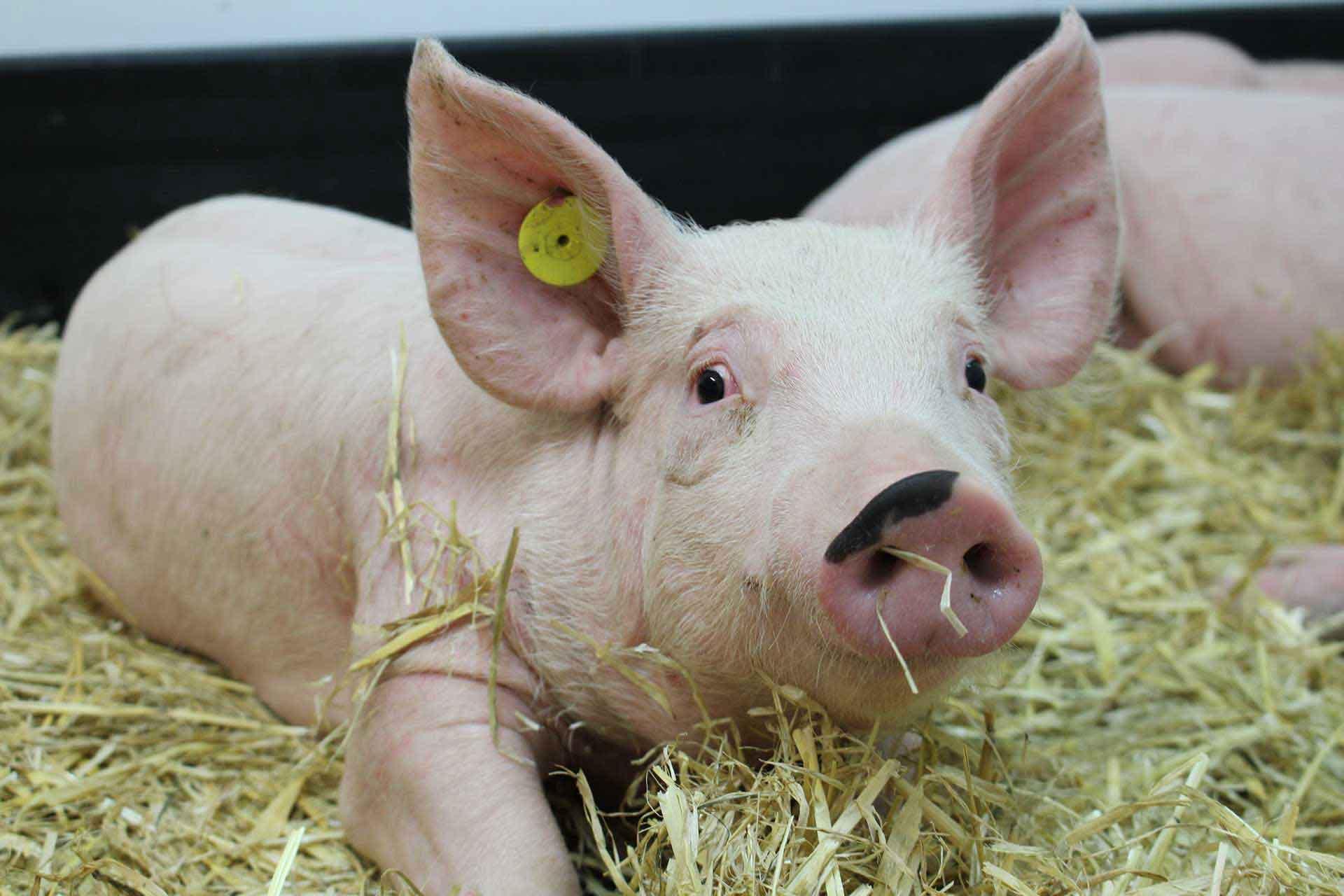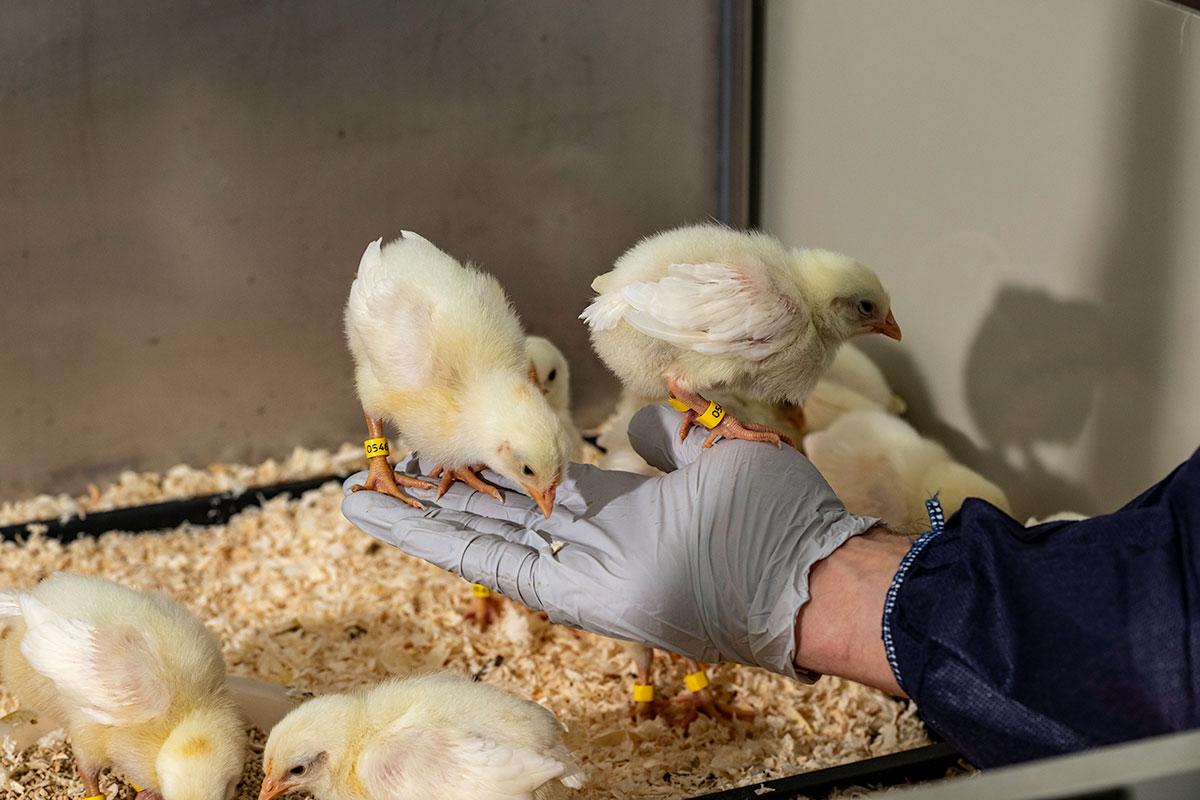The principles of the 3Rs, Replacement, Reduction and Refinement were developed over 50 years ago as a framework for humane animal research.
Improvements in veterinary medicines and diagnosis are the result of years of research and development. Much of the time is spent doing research in laboratories. However, the sheer complexity of diseases and the hosts’ immune responses to them means that experiments with animals are essential to better understand the disease and to develop new methods of control.
At The Pirbright Institute this usually entails working with the species for whose improved health the research is directed (cattle, poultry, sheep and pigs). We also use small numbers of mice and rabbits in our research.
Whilst the number of animals used at the Institute is very small compared to the millions that benefit from the Institute’s research, we strive to apply the principles of the 3Rs for the benefit of animals used in research and for the quality of the data that they yield.
Ethical review
All experimental protocols are subject to scrutiny by the ethical review process, before submission to the Home Office for Licencing approval. A fundamental consideration when writing and reviewing such protocols is the application of the 3Rs and impact on animal welfare.
ASF research
Pirbright scientists researching African swine fever virus (ASFV) are committed to the 3Rs principles.
Before beginning any research involving animals, experimental design is carried out in collaboration with statisticians to ensure statistically relevant results are obtained. Vaccine candidates are extensively tested in cell cultures before advancing to the stage of animal experiments to reduce the number of animals needed.
The use of standardised clinical and pathology scoring facilitates comparisons between experiments and thus reduces the numbers of groups which have to be used in each experiment. Continued re-evaluation of results from experiments mean the data collected can be refined and the outcomes of experiments can be predicted based on cell culture and analysis of host responses that correlate with protection.
Cells taken from immune animals are also used to identify those ASFV proteins that are recognised by the host immune system which may be capable of inducing protection. This greatly reduces the requirement for animal experiments to obtain this information.
FMD vaccine matching
Foot and mouth disease virus (FMDV) is an extremely variable virus. Successful control involves identifying the right vaccine to use and demonstrating the efficacy of batches of the selected vaccine. This used to involve vaccination of cattle (a group of cattle for each vaccine to be assessed) which would then be challenged (inoculated) with virus. The Institute now uses serologically based methods that have greatly reduced both the number of cattle that are used and those that are challenged.
Together with mathematical modellers at Glasgow University, researchers are working towards a robust and challenge-free computational based model for the assessment of FMD vaccine efficacy.
Lumpy skin disease (LSD)
In order to improve the range of diagnostic, control and prevention tools available for lumpy skin disease (LSD), Pirbright scientists have optimised an experimental model of the disease. The 3Rs were guiding principles underpinning the research and considered throughout the model development. The group have provided serum with high titres of lumpy skin disease virus (LSDV) antibodies from the LSDV-infected cattle to the OIE Capripoxvirus Reference Laboratory, based at Pirbright, for assay validation. Tissue and fluid samples are also being provided to international colleagues to avoid them from having to duplicate the in-vivo LSD experiments. For example polymorphonuclear blood cells and sera have been provided to the H2020 project DEFEND to support development of novel diagnostic tests for LSD.
Tissues from LSD-affected animals are being made into a histology 'slide set' in collaboration with the Scottish Agricultural College. These will be used to teach trainee pathologists about LSD lesions. We hope to make these freely available in electronic form in the future.
Porcine reproductive and respiratory syndrome (PRRS)
Pirbright scientists researching Porcine reproductive and respiratory syndrome (PRRS) have established a collaboration with a university in Spain who have access to sow herds with detailed histories of PRRSV vaccination and disease breakthroughs. Serum samples, originally collected for veterinary purposes, have been received from these herds and screened for PRRSV neutralisation. This screening provides a simple yet effective approach to identify animals with broadly neutralising antibodies. Monoclonal antibodies can be produced from blood cells isolated from these animals and used to support vaccine development by defining highly conserved sites on PRRSV. This will significantly reduce the number of animals required to achieve this objective.
Infectious bursal disease virus (IBDV)
By utilising primary bursal cells instead of live chickens to evaluate the genes that are upregulated following infection with different strains of virus, and in different inbred lines of birds, as well as titrating viruses and studying immune escape, the group have reduced the number of infected chickens that they would otherwise have used.
Porcine reproductive and respiratory syndrome (PRRS)
Pirbright scientists researching Porcine reproductive and respiratory syndrome (PRRS) and African swine fever have collaborated with scientists from a university in the UK to test self-renewing, growth factor-dependent porcine macrophages from neonatal liver and spleen. The group have demonstrated that these cells show susceptibility to PRRSV and ASFV infection comparable to alveolar and bone-marrow derived macrophages. In future, these cells will be used for PRRSV and ASFV propagation, PRRSV neutralisation assays and for assessing PRRSV/influenza/ASFV virus interactions in vitro to replace the need to cull animals for the harvesting of tissues for macrophage isolation.
Infectious bursal disease virus (IBDV)
The group discovered that primary bursal cells obtained from uninfected chickens could be cultured in the lab and used to support infectious bursal disease virus (IBDV) replication. These cells were then used to study the genes that were expressed following IBDV infection of the cells in the lab, without the need to infect the birds, thereby replacing the use of birds for these studies.
Through this research, a linear relationship between virus titration in B cells and embryonated eggs was discovered, meaning that the group could replace embryo titration with cell-titration. The discovery that B cells could also be used to model antigenic drift and immune escape enabled the further replacement of the use of birds in these experiments. In addition the primary bursal cell system for studying the biology of IBDV has been adopted by other labs. This has led to additional publications arising from these labs demonstrating the group’s work has had a lasting impact on the wider IBDV field, further replacing the use of birds with cells in different countries across the globe.
Feeding our insect colonies
Colonies of biting midges and mosquitoes were traditionally fed using mice. The Institute has shown that the insects can be fed successfully using artifical membrane-based feeding units. We now only used this for feeding our insect colonies.
Animal housing and enrichment
Animals used in research at The Pirbright Institute are housed under strictly controlled conditions.
Refinement includes environmental enrichment for animals used in experiments. Our NACWO’s are constantly investigating new areas and types of enrichment for their animals. Enrichment is available to provide a stimulating environment in order for the animals to demonstrate their species typical behavior and to enhance and ensure their well-being. Animals are also housed in groups where possible to allow for normal social interaction.
The Pirbright Institute provides all species with a range of enrichment items. Large animals are provided with mineral licks, brushes, treats, bedding material and/or rubber matting. Small animals are provided with red polycarbonate huts which provides them with a sense of security and shelter by reducing the level of perceived light, running wheels, tubes, fruit and vegetables, nest boxes and nesting material.
Lumpy skin disease (LSD)
In their research to optimise an experimental model of lumpy skin disease (LSD), Pirbright scientists have characterised the behavioural, physiological, immunological and virological changes that occur in LSD in order to identify predictive markers that can be used to define humane end points for future studies. In addition, they have developed LSD-specific daily 'scoring charts' to clearly determine the level of pain, suffering and distress in each animal.
A surgical microbiopsy technique (a 1mm diameter skin biopsy) has been developed to measure the quantity of lumpy skin disease virus (LSDV) in the skin of cattle. This procedure is less invasive and less painful than a more traditional skin biopsy (8mm) which requires local anaesthetic and suturing. The microbiopsy is well tolerated and provides sufficient tissue for detection and assessment of the levels of LSDV in the skin.
Infectious bursal disease virus (IBDV)
Although it was necessary to infect birds to grow sufficient stocks of field strains of IBDV, the group observed that while the clinical signs peaked in severity at 72 hours post-infection (hpi), virus replication peaked at 48 hpi and remained high at 72 hpi. They therefore selected 48 hpi as their optimal time-point for harvesting virus, to obtain sufficiently high titre stocks, while ensuring birds did not suffer from peak clinical signs.
Application of the 3Hs Initiative
The Institute recently completed a study using rats; a species not previously required in our scientific research. This was an opportunity to work with a new animal species and required the development of the latest and most refined husbandry and handling techniques.
The 3Hs Initiative was identified which, through refined housing, handling and habituation methods, aims to improve the welfare and scientific outcomes of laboratory rodents. As part of our commitment to continuous improvement, two Animal Technicians visited another establishment to gain direct, hands-on experience with rodents at various stages of 3Hs training. We also benefited from the ongoing support of one of their experienced Technicians who joined us on-site to provide additional expertise during the study.
Playpens were provided at regular timepoints throughout the study to encourage natural behaviours including social play, climbing and foraging.
To refine the dosing procedure, the rats were trained using condensed milk rewards. Once the animals were fully conditioned to this, the study compound was added to the milk, allowing for a welfare focused administration method.
This approach proved highly effective and represents a significant advancement in our refinement practices, and will be adopted in future rodent studies.


